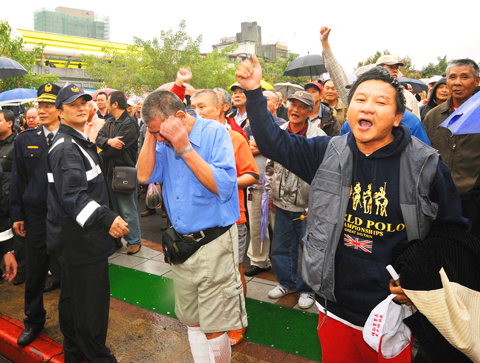President Ma Ying-jeou (馬英九) was heckled in Taipei's Wanhua District (萬華) yesterday when he attended a ceremony marking the 270th anniversary of the establishment of Longshan Temple (龍山寺).
About 30 protesters shouted “Ma Ying-gao, step down” (gao means “dog” in Taiwanese) outside the temple. The temple was closed yesterday morning because of Ma's visit. While the president left at around 11am, the temple was not open to the public until 1:30pm.
Ma visited the temple to attend the ceremony marking the 270th anniversary of the temple's construction and the completion of the renovation of the temple's Tung Pao Hall (通寶殿) and its bell and drum towers.

PHOTO: FANG PIN-CHAO, TAIPEI TIMES
Built in 1738, Longshan Temple was designated as a second-class national historic heritage site in 1985. An earthquake on Sept. 21, 1999, destroyed some of the stone pillars of the Tung Pao Hall, while some of the hall's wooden structure had rotted over time.
The “921 Earthquake” and the earthquake on March 31, 2002, also dealt a blow to the temple's bell and drum towers.
The temple was placed under tight security yesterday, with law enforcement officers forming a human chain to block the entrances.
An old married couple from Taoyuan said the temple manager told them that they had posted the announcement that the temple would be closed about a month ago, but they had no way of knowing because they lived in Taoyuan.
The temple manager told them the information was also available online, but they said they did not know how to use a computer.
Ma, who spent his childhood in Wanhua District, said Longshan Temple has been the center of religious worship since he was little. The temple has become one of the city's world-renowned landmarks, which include Taipei 101, the National Palace Museum and Chiang Kai-shek Memorial Hall, he said.
During his tenure as Taipei mayor, Ma said the city decided to open a Mass Rapid Transit System station at Longshan Temple, hoping to blend the old and new.
The city hoped the temple would continue to bless the region and ensure its prosperity, he said.

Taiwan is stepping up plans to create self-sufficient supply chains for combat drones and increase foreign orders from the US to counter China’s numerical superiority, a defense official said on Saturday. Commenting on condition of anonymity, the official said the nation’s armed forces are in agreement with US Admiral Samuel Paparo’s assessment that Taiwan’s military must be prepared to turn the nation’s waters into a “hellscape” for the Chinese People’s Liberation Army (PLA). Paparo, the commander of the US Indo-Pacific Command, reiterated the concept during a Congressional hearing in Washington on Wednesday. He first coined the term in a security conference last

Prosecutors today declined to say who was questioned regarding alleged forgery on petitions to recall Democratic Progressive Party (DPP) legislators, after Chinese-language media earlier reported that members of the Chinese Nationalist Party (KMT) Youth League were brought in for questioning. The Ministry of Justice Investigation Bureau confirmed that two people had been questioned, but did not disclose any further information about the ongoing investigation. KMT Youth League members Lee Hsiao-liang (李孝亮) and Liu Szu-yin (劉思吟) — who are leading the effort to recall DPP caucus chief executive Rosalia Wu (吳思瑤) and Legislator Wu Pei-yi (吳沛憶) — both posted on Facebook saying: “I

The Ministry of Economic Affairs has fined Taobao NT$1.2 million (US$36,912) for advertisements that exceed its approved business scope, requiring the Chinese e-commerce platform to make corrections in the first half of this year or its license may be revoked. Lawmakers have called for stricter enforcement of Chinese e-commerce platforms and measures to prevent China from laundering its goods through Taiwan in response to US President Donald Trump’s heavy tariffs on China. The Legislative Yuan’s Finance Committee met today to discuss policies to prevent China from dumping goods in Taiwan, inviting government agencies to report. Democratic Progressive Party Legislator Kuo Kuo-wen (郭國文) said

The Ministry of Economic Affairs has fined Taobao NT$1.2 million (US$36,900) for advertisements that exceeded its approved business scope and ordered the Chinese e-commerce platform to make corrections in the first half of this year or its license would be revoked. Lawmakers have called for stricter supervision of Chinese e-commerce platforms and more stringent measures to prevent China from laundering its goods through Taiwan as US President Donald Trump’s administration cracks down on origin laundering. The legislature’s Finance Committee yesterday met to discuss policies to prevent China from dumping goods in Taiwan, inviting government agencies to report on the matter. Democratic Progressive Party